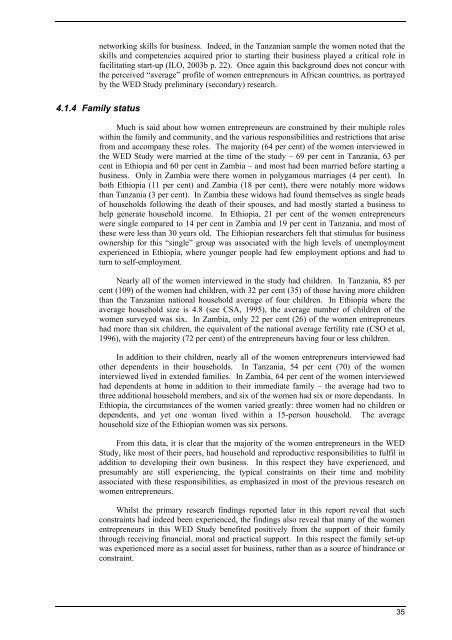The Challenges of Growing Small Businesses - International Labour ...
The Challenges of Growing Small Businesses - International Labour ...
The Challenges of Growing Small Businesses - International Labour ...
Create successful ePaper yourself
Turn your PDF publications into a flip-book with our unique Google optimized e-Paper software.
networking skills for business. Indeed, in the Tanzanian sample the women noted that the<br />
skills and competencies acquired prior to starting their business played a critical role in<br />
facilitating start-up (ILO, 2003b p. 22). Once again this background does not concur with<br />
the perceived “average” pr<strong>of</strong>ile <strong>of</strong> women entrepreneurs in African countries, as portrayed<br />
by the WED Study preliminary (secondary) research.<br />
4.1.4 Family status<br />
Much is said about how women entrepreneurs are constrained by their multiple roles<br />
within the family and community, and the various responsibilities and restrictions that arise<br />
from and accompany these roles. <strong>The</strong> majority (64 per cent) <strong>of</strong> the women interviewed in<br />
the WED Study were married at the time <strong>of</strong> the study – 69 per cent in Tanzania, 63 per<br />
cent in Ethiopia and 60 per cent in Zambia – and most had been married before starting a<br />
business. Only in Zambia were there women in polygamous marriages (4 per cent). In<br />
both Ethiopia (11 per cent) and Zambia (18 per cent), there were notably more widows<br />
than Tanzania (3 per cent). In Zambia these widows had found themselves as single heads<br />
<strong>of</strong> households following the death <strong>of</strong> their spouses, and had mostly started a business to<br />
help generate household income. In Ethiopia, 21 per cent <strong>of</strong> the women entrepreneurs<br />
were single compared to 14 per cent in Zambia and 19 per cent in Tanzania, and most <strong>of</strong><br />
these were less than 30 years old. <strong>The</strong> Ethiopian researchers felt that stimulus for business<br />
ownership for this “single” group was associated with the high levels <strong>of</strong> unemployment<br />
experienced in Ethiopia, where younger people had few employment options and had to<br />
turn to self-employment.<br />
Nearly all <strong>of</strong> the women interviewed in the study had children. In Tanzania, 85 per<br />
cent (109) <strong>of</strong> the women had children, with 32 per cent (35) <strong>of</strong> those having more children<br />
than the Tanzanian national household average <strong>of</strong> four children. In Ethiopia where the<br />
average household size is 4.8 (see CSA, 1995), the average number <strong>of</strong> children <strong>of</strong> the<br />
women surveyed was six. In Zambia, only 22 per cent (26) <strong>of</strong> the women entrepreneurs<br />
had more than six children, the equivalent <strong>of</strong> the national average fertility rate (CSO et al,<br />
1996), with the majority (72 per cent) <strong>of</strong> the entrepreneurs having four or less children.<br />
In addition to their children, nearly all <strong>of</strong> the women entrepreneurs interviewed had<br />
other dependents in their households. In Tanzania, 54 per cent (70) <strong>of</strong> the women<br />
interviewed lived in extended families. In Zambia, 64 per cent <strong>of</strong> the women interviewed<br />
had dependents at home in addition to their immediate family – the average had two to<br />
three additional household members, and six <strong>of</strong> the women had six or more dependants. In<br />
Ethiopia, the circumstances <strong>of</strong> the women varied greatly: three women had no children or<br />
dependents, and yet one woman lived within a 15-person household. <strong>The</strong> average<br />
household size <strong>of</strong> the Ethiopian women was six persons.<br />
From this data, it is clear that the majority <strong>of</strong> the women entrepreneurs in the WED<br />
Study, like most <strong>of</strong> their peers, had household and reproductive responsibilities to fulfil in<br />
addition to developing their own business. In this respect they have experienced, and<br />
presumably are still experiencing, the typical constraints on their time and mobility<br />
associated with these responsibilities, as emphasized in most <strong>of</strong> the previous research on<br />
women entrepreneurs.<br />
Whilst the primary research findings reported later in this report reveal that such<br />
constraints had indeed been experienced, the findings also reveal that many <strong>of</strong> the women<br />
entrepreneurs in this WED Study benefited positively from the support <strong>of</strong> their family<br />
through receiving financial, moral and practical support. In this respect the family set-up<br />
was experienced more as a social asset for business, rather than as a source <strong>of</strong> hindrance or<br />
constraint.<br />
35
















